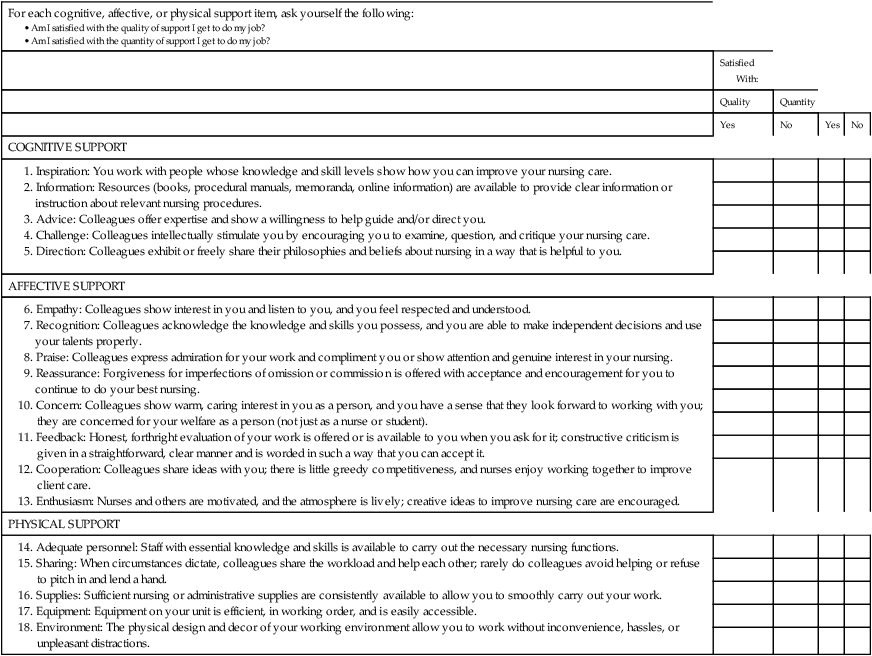Chapter 17 1. Discuss the relationship between social support and health 2. Complete a support system assessment 3. Distinguish between assertive, nonassertive, and aggressive requests for support 4. Practice making requests for support in selected exercises Research on the relationship between social support and health has important implications for nursing practice today. The literature suggests that a positive relationship exists between the presence of social support and health and coping with illness (Komblith et al, 2001; Adams et al, 2000). In a study of the work environment of secondary school teachers, co-worker support had an inverse relationship to anxiety and depression (Mahan et al, 2010). Employers are looking at ways to support nurses in order to reduce stress and promote recruitment and retention. The American Nurses Credentialing Center (2010) defines criteria for the selection of healthcare organizations that demonstrate sustained excellence in nursing care in the Magnet Recognition Program, by supporting nurses in professional practice. Nurse administrators are challenged to take the leadership role in creating work environments that support nurses by asking nurses how they want to be supported, being sensitive to nurses’ stress, and understanding the emotional risks nurses face at work (Ingala and Hill, 2001; Kerfoot, 2001). Leaders are encouraged to demonstrate their own compassion and to recognize the economic benefits of institutional compassion in times of trauma. For example, Mayor Rudolph Giuliani’s public display of grief strengthened people’s resolve to rebuild and restore confidence in New York after the bombing of the World Trade Center on September 11, 2001 (Dutton et al, 2002). Cognitive support helps you think intelligently about your job, decide how to approach problems, and discover the how and why of doing things a certain way, and it also provides some criteria for doing your work. One method of providing nurses with cognitive support is through mentors. In a study using a mentorship model, newly graduated nurses who were mentored demonstrated a higher level of competency as evaluated by their head nurses than they did in two evaluations prior to the mentorship (Komaratat and Oumtanee, 2009). From mentors, nurses receive career advice, intellectual stimulation, and role modeling. New nurses receive needed support to promote retention, and experienced nurses are challenged to advance their knowledge base, sharpen consultative skills, and initiate needed change. Peer mentoring is another potential solution for support. At a university in southern Ontario, senior nursing students became role models and resources for other students in relationships that were mutually beneficial (Dennison, 2010). See “Looking for a Mentor” later in this chapter. Affective support is acknowledgment for the work you do and a feeling of nurturance. Nurse managers need continued support and confirmation of their important role in today’s world, in which nursing practices are changing, clients’ conditions are more acute, and recruitment and retention are challenging issues (Sala, 2002). Respect, honor, and recognition of employees by the acknowledgment of positive performance are needed frequently, not only during an annual review. Expressing gratitude and appreciation can create feelings of goodwill and nurturance among nurses, which is a form of job gratification that makes them feel better about their workplaces, clients, and colleagues (Doherty, 2002). Mentoring can also provide affective support. In a study of a mentorship program initiated when the nurse turnover rate increased to 31%, nurses working in inpatient units, surgery, and emergency rooms who participated in a 1-year pilot program had a 0% turnover rate. Three years after the program continued and was expanded to other departments, the hospital staff turnover rate decreased to 10.3% (Fox, 2010). Callahan (1990) believes that burnout occurs when nurses realize that no matter how developed their talents are, they receive no recognition. She urges hospitals to initiate a system of positive incident reports that can be posted on the unit’s bulletin board and then be included in the staff nurses’ personnel files. A commendation for work well done might look as follows: “I’d like to commend Sheila Jersey, RN, for the empathy she showed the client in room 1039 on the night of 10/12/98. Her words cut through his pain and delirium, grounding him in reality and allowing him to rest without further medication. She has a special ability to say just what the client needs to hear.” Look at the checklist in Box 17-1, grab a pencil, and indicate the pluses and minuses in your support system. • What exactly dissatisfies me about the quantity or quality of the support? • If I had a choice, how would I change things to ensure that I receive the support I need? • Who is the best person to ask for this support? • What is the best way to seek this support? • How can I present my case in a way that increases the probability of securing the support I want at work or school?
Requesting support
Recognizing the importance of social support for health and work life
Determining the support you need at work or school
Requesting the support you need at work or school
Requesting support
Get Clinical Tree app for offline access




